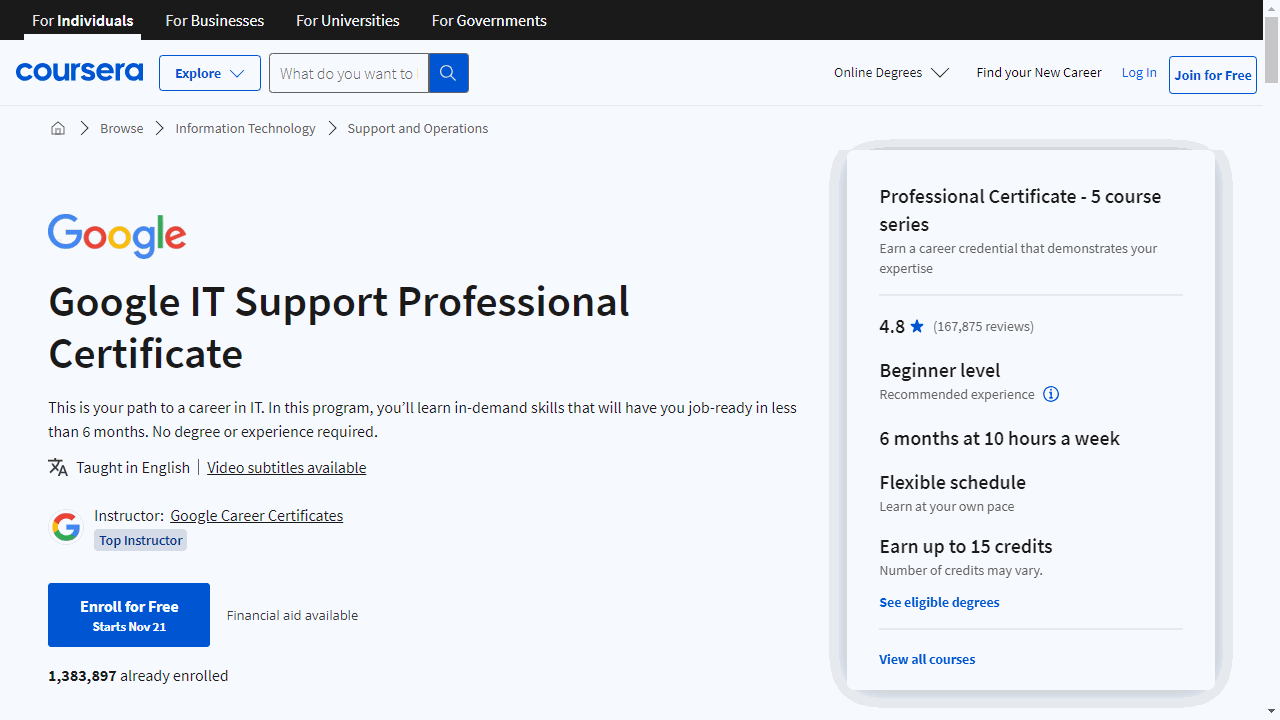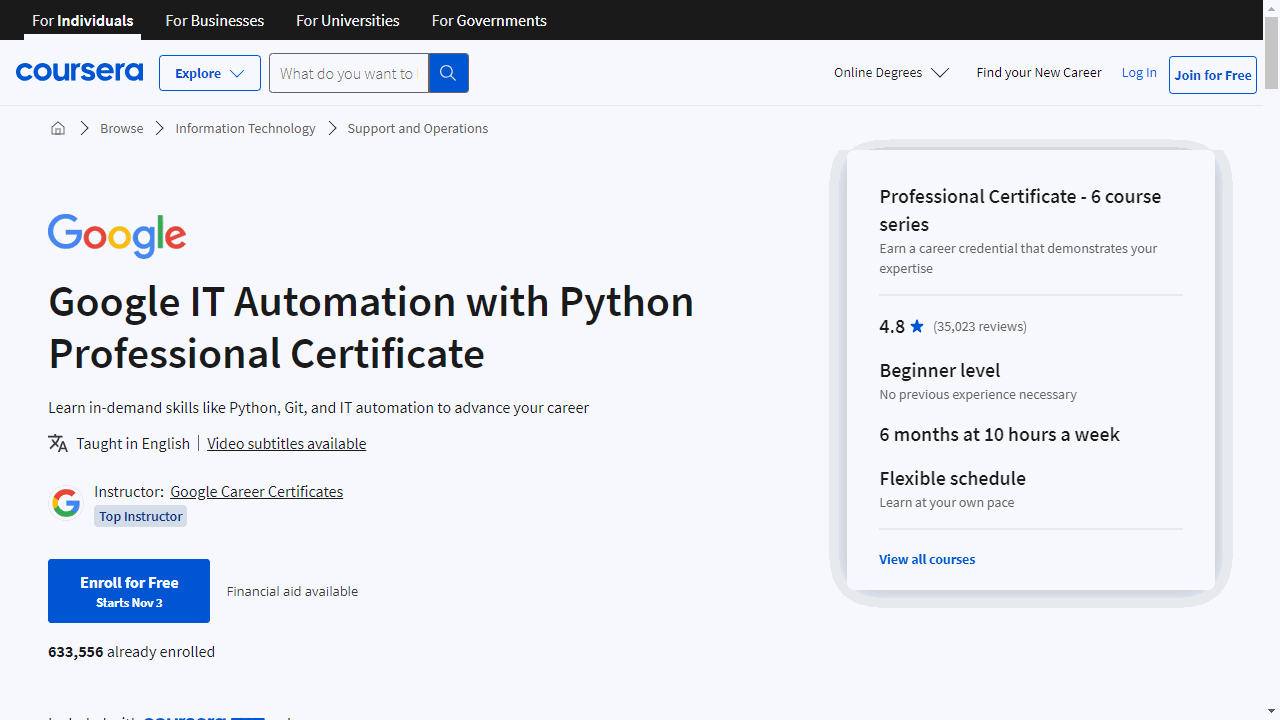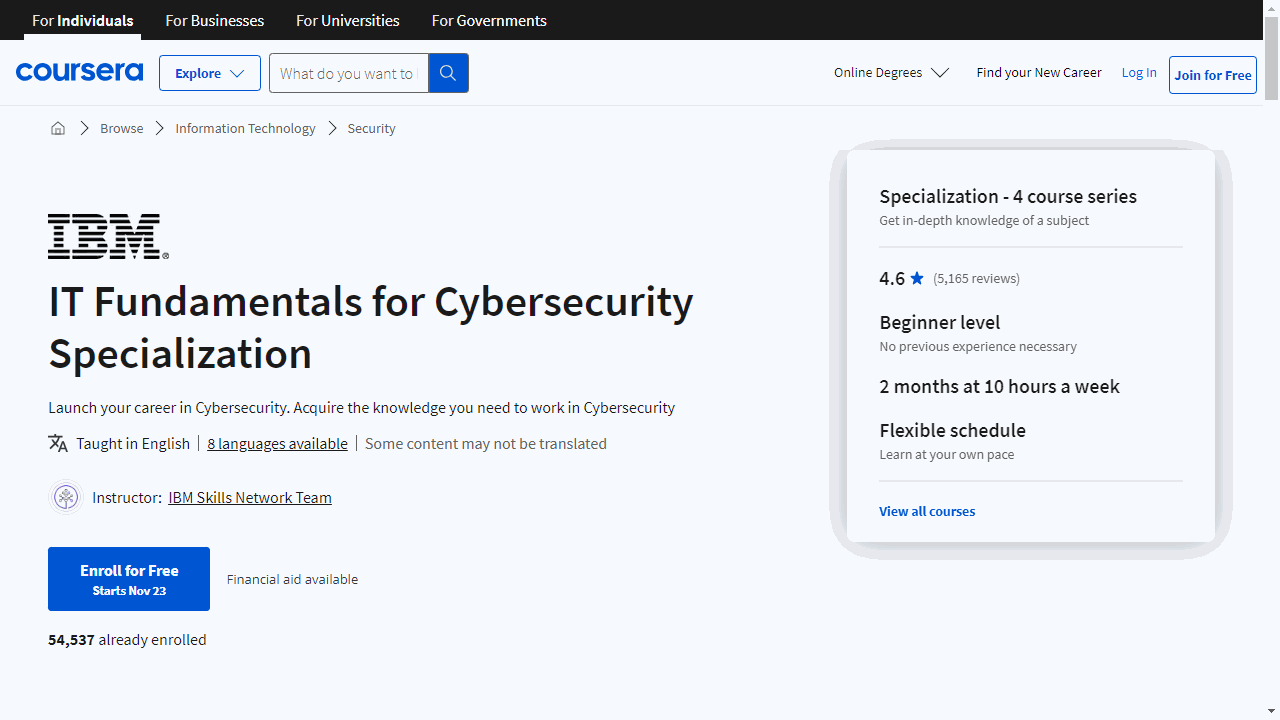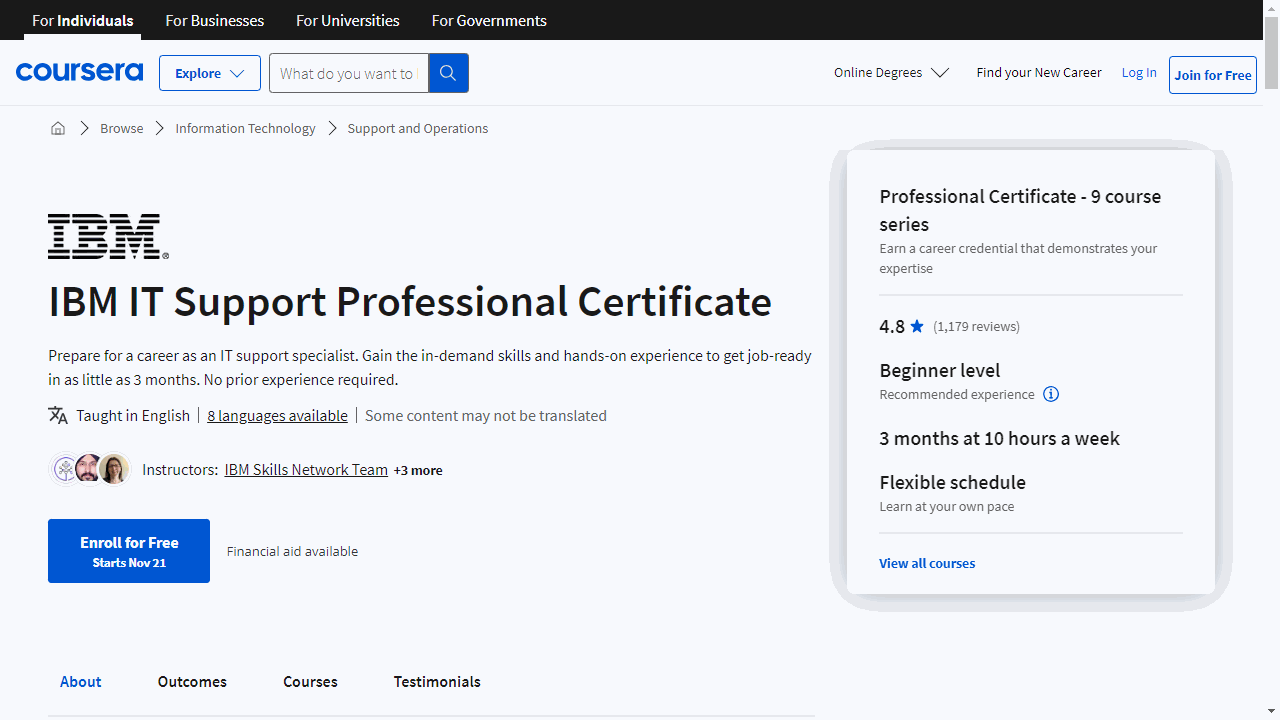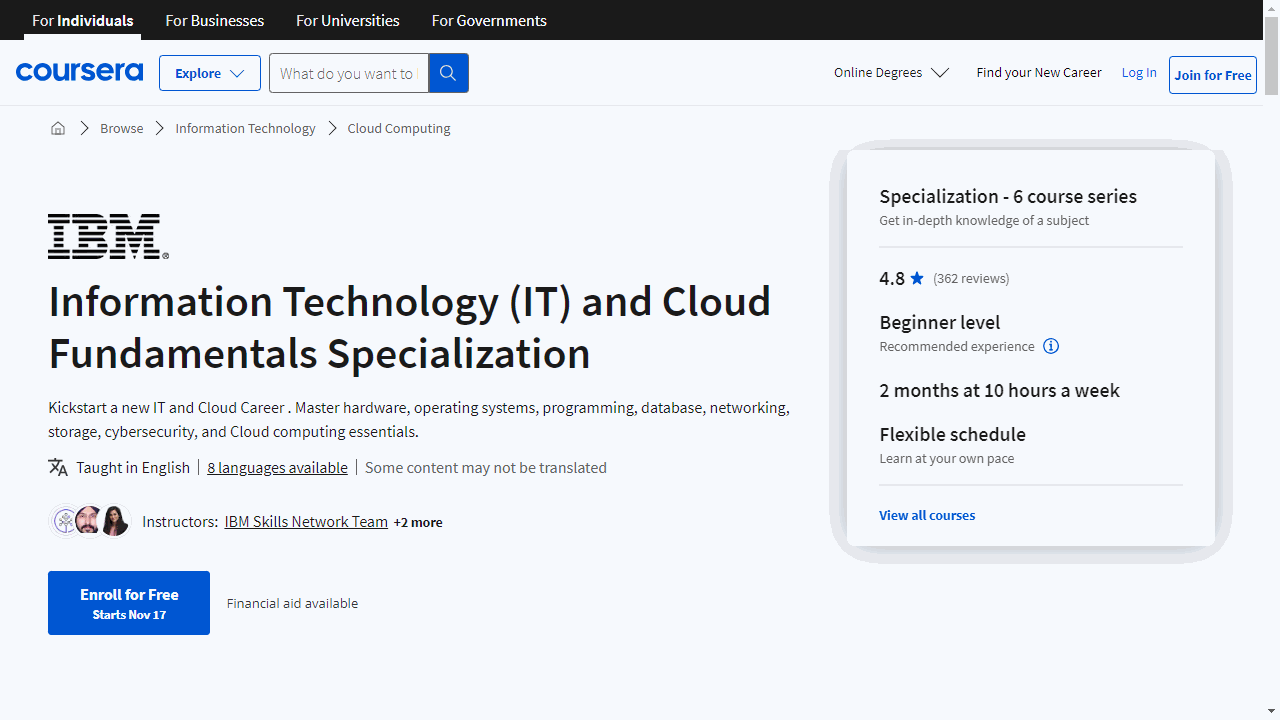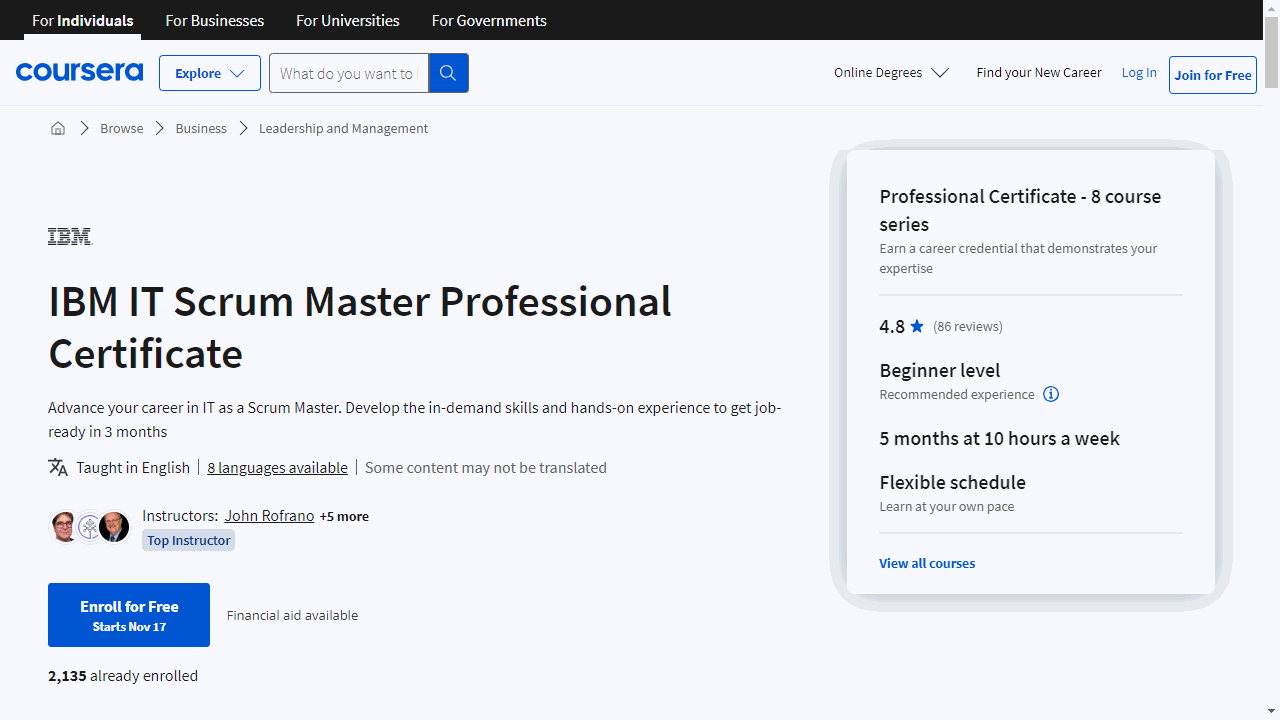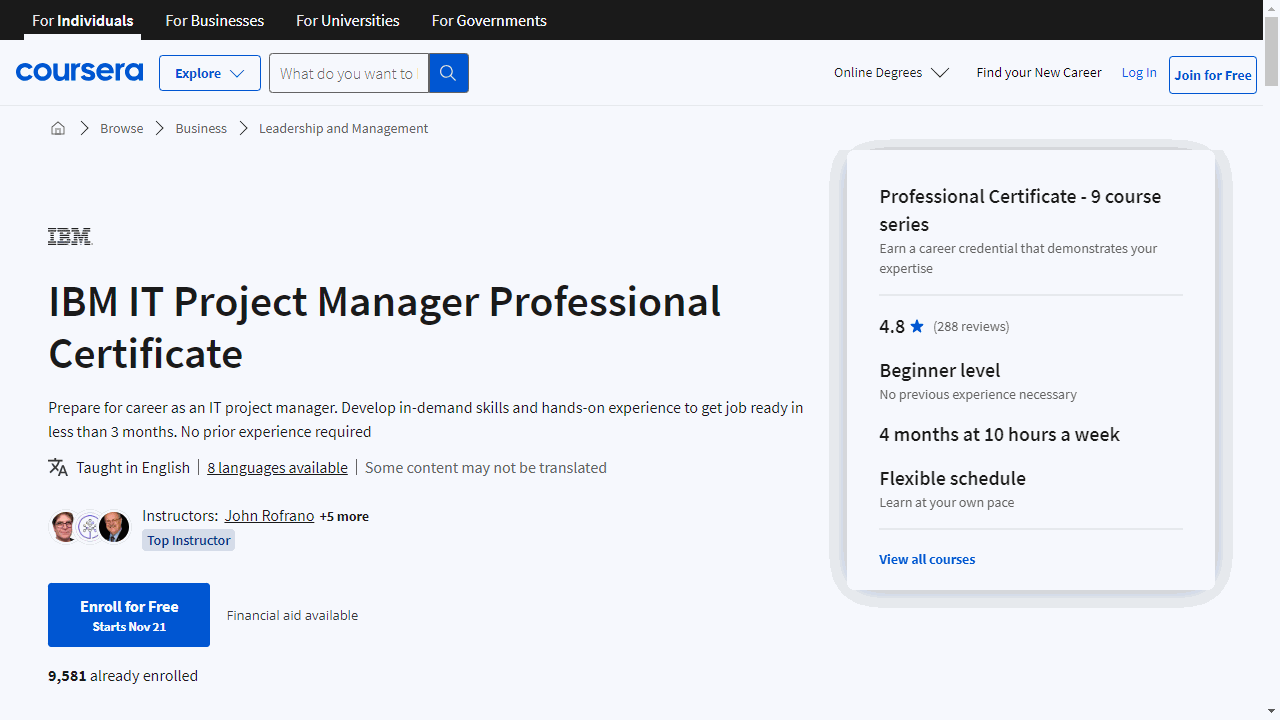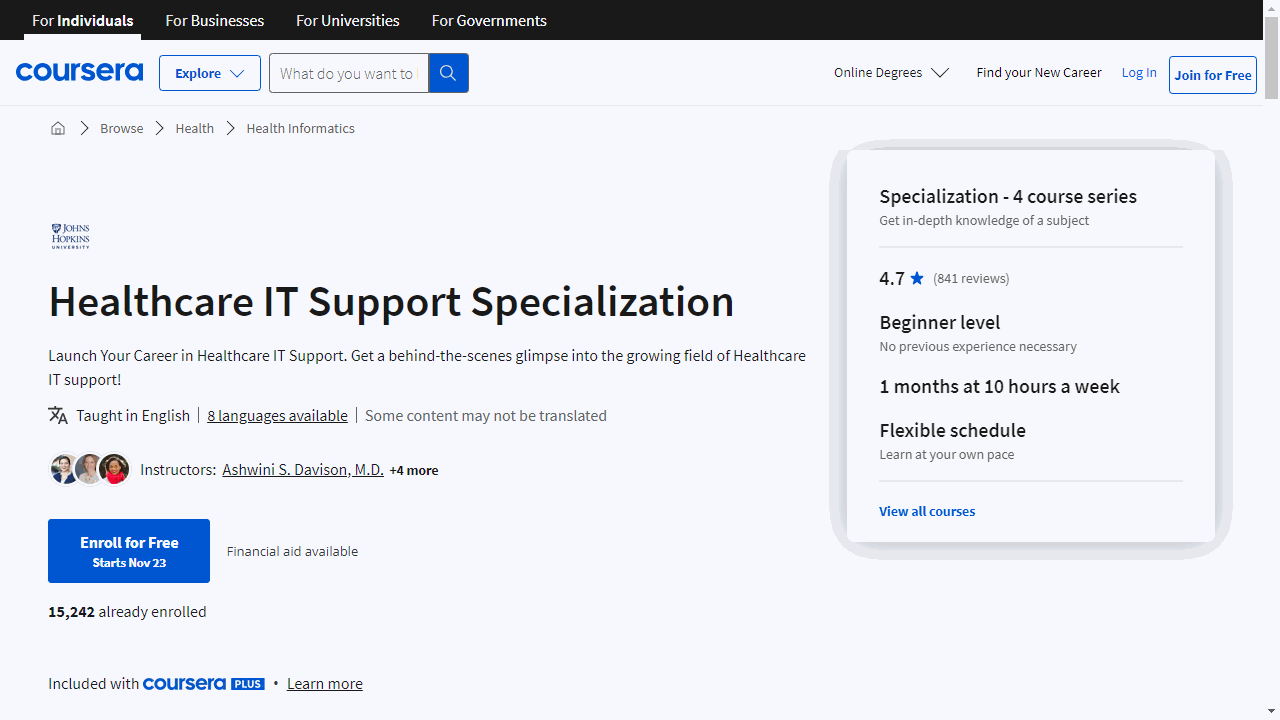Google IT Support Professional Certificate
Embarking on a journey to become an IT support specialist?
The “Google IT Support Professional Certificate” on Coursera is a comprehensive program that could be just what you’re looking for.
The journey begins with “Technical Support Fundamentals,” where you’ll get acquainted with the IT landscape.
This course isn’t just about theory; it’s hands-on, allowing you to understand the binary system, put together a computer, and install operating systems.
You’ll also gain insight into the Internet’s workings and the intricacies of computer software, all while honing your problem-solving and customer service skills.
Moving on to “The Bits and Bytes of Computer Networking,” this course demystifies the complex world of networks.
You’ll learn about the layered nature of computer networks, delve into TCP/IP protocols, and acquire network troubleshooting skills.
It also introduces you to the essentials of cloud computing, including storage and services, which are vital in today’s tech ecosystem.
With “Operating Systems and You: Becoming a Power User,” you’ll dive deeper into the operational side of computers.
Whether it’s through a graphical user interface or command line, you’ll learn to navigate, configure, and manage both Windows and Linux systems.
This course is about giving you the practical skills to manage software, users, and hardware effectively.
In “System Administration and IT Infrastructure Services,” the focus shifts to managing multiple systems within an organization.
You’ll explore how to select the right hardware, understand infrastructure services, and leverage cloud resources efficiently.
The course also covers directory services and disaster recovery, preparing you to maintain and protect an organization’s IT infrastructure.
Lastly, “IT Security: Defense against the digital dark arts” arms you with the knowledge to safeguard digital assets.
You’ll delve into encryption, understand the principles of authentication and authorization, and learn how to mitigate risks.
This course is crucial for anyone looking to ensure the security and integrity of a network.
Each course in the certificate program is designed to build on the previous one, ensuring a smooth learning curve.
You’ll gain not just theoretical knowledge but also practical skills through a blend of video lectures, demonstrations, and hands-on practice.
This program is a solid step towards a career in IT, providing you with the skills that are in demand in the workforce today.
Google IT Automation with Python Professional Certificate
This hands-on certificate program teaches you Python, Git and GitHub, Linux, and IT automation from the ground up.
You’ll start by learning basic Python programming.
“The Crash Course on Python” teaches you Python syntax, data structures, and how to build simple programs. No prior experience needed!
Next, “Using Python to Interact with the Operating System” shows you how to manipulate files, processes, and automate tasks on any operating system.
“Introduction to Git and GitHub” teaches you to track code changes and collaborate with version control.
The certificate also covers crucial troubleshooting and debugging skills. You’ll learn strategies to tackle common pitfalls in code and IT infrastructure.
“Configuration Management and the Cloud” helps you automate fleet management and cloud computing.
Finally, you’ll tie everything together by building real-world automation solutions in Python.
The skills covered equip you to automate tasks, process data, build tools to solve problems, and more.
IT Fundamentals for Cybersecurity Specialization
This suite of courses is meticulously designed to build your cybersecurity expertise from the ground up.
The journey begins with “Introduction to Cybersecurity Tools & Cyber Attacks,” where you’ll delve into the evolution of cybersecurity, understand the motives behind cyber threats, and familiarize yourself with essential concepts and tools.
This course doesn’t just teach you the basics; it sharpens your critical thinking skills, which are vital in the cybersecurity realm.
Completing this course earns you an IBM digital badge, a valuable addition to your professional profile.
Next, “Cybersecurity Roles, Processes & Operating System Security” offers a closer look at the human and procedural aspects of cybersecurity.
You’ll explore various roles within an organization and the key processes that fortify its defenses.
The course also covers operating system security for Windows, Mac/OS, Linux, and Mobile, along with the concept of virtualization.
Another IBM digital badge awaits you upon completion, marking your growing expertise.
In “Cybersecurity Compliance Framework & System Administration,” you’ll tackle the critical topics of compliance and industry standards, such as NIST and GDPR.
The course equips you with practical skills in user and server administration, emphasizing the importance of patch management and endpoint security.
You’ll also dive into cryptography, learning how encryption protects company software.
Lastly, “Network Security & Database Vulnerabilities” rounds out your education with a focus on protecting an organization’s network infrastructure.
You’ll grasp the essentials of the TCP/IP and OSI models, and understand how to secure databases against common threats like SQL Injection.
This knowledge is crucial for identifying and mitigating network vulnerabilities.
Each course in this specialization is a stepping stone towards becoming a proficient Jr Cybersecurity Analyst.
The IBM digital badges you collect along the way not only validate your skills but also enhance your employability in the ever-evolving IT landscape.
IBM IT Support Professional Certificate
The journey begins with “Introduction to Technical Support,” where you’ll grasp the essentials of IT support roles and responsibilities.
This course demystifies the field, offering insights from experts and introducing you to the tools of the trade, such as ticketing systems.
It’s a practical first step, providing a clear understanding of the support landscape.
Moving on to “Introduction to Hardware and Operating Systems,” you’ll delve into the physical components that power technology.
This course lays a foundation for recognizing and troubleshooting hardware issues, a critical skill for any IT professional.
It’s also a gateway to further certification, aligning with CompTIA exam objectives.
Software is at the heart of IT, and “Introduction to Software, Programming, and Databases” covers the basics.
From cloud computing to programming with Python, this course broadens your software knowledge and includes interactive exercises to reinforce learning.
Networks are crucial to IT infrastructure, and “Introduction to Networking and Storage” ensures you’re well-versed in setting up and maintaining these systems.
You’ll learn about different storage options and how to troubleshoot common network issues, a skill set that’s in high demand.
With cyber threats increasingly prevalent, “Introduction to Cybersecurity Essentials” is timely and relevant.
This course equips you with the knowledge to safeguard information and understand common cyber-attacks, preparing you for roles that prioritize security.
Cloud computing is reshaping the IT landscape, and “Introduction to Cloud Computing” provides a comprehensive overview of this field.
You’ll explore various cloud service models and gain hands-on experience by deploying an application, a valuable skill for modern IT roles.
For those targeting CompTIA certifications, “Practice Exam for CompTIA ITF+ Certification” is an invaluable resource.
This course offers a simulated exam experience, helping you gauge your readiness and identify areas for improvement.
The “Technical Support (IT) Case Studies and Capstone” course is where theory meets practice.
You’ll tackle real-world technical support scenarios, honing your problem-solving skills and preparing you for the challenges of an IT support role.
Finally, “Tech Support Career Guide and Interview Preparation” provides guidance on entering the job market.
From crafting a compelling resume to acing interviews, this course offers practical advice to enhance your job prospects.
IBM Information Technology (IT) and Cloud Fundamentals Specialization
This series of courses is designed to build your IT and cloud computing knowledge from the ground up, with a focus on practical skills and real-world applications.
The journey begins with “Introduction to Hardware and Operating Systems,” where you’ll gain essential knowledge about computer hardware and operating systems.
This course is more than just an introduction; it’s a hands-on experience that will enable you to perform IT tasks such as setting up workstations and troubleshooting common issues.
It’s also a stepping stone towards CompTIA ITF+ and A+ certifications, which are valuable credentials in the tech industry.
Moving on, “Introduction to Software, Programming, and Databases” expands your understanding of software applications and introduces you to programming fundamentals.
You’ll explore the intricacies of software compatibility, cloud computing, and database management.
By the end of this course, you’ll have a clearer picture of how software development and cloud technologies play pivotal roles in modern business.
The “Introduction to Cloud Computing” course is specifically tailored for those looking to grasp the essentials of cloud services.
You’ll learn about various cloud service models and gain insights into the offerings of major cloud providers.
The course culminates in a project where you’ll apply your knowledge by deploying an application using serverless architecture.
Networking is a vital component of IT, and “Introduction to Networking and Storage” ensures you’re well-versed in this area.
You’ll understand network types, storage options, and how to troubleshoot network issues.
The course includes practical activities that reinforce the material, helping you to develop the skills needed to maintain and secure networks.
Cybersecurity is a critical concern, and “Introduction to Cybersecurity Essentials” addresses this by teaching you how to protect against common security threats.
You’ll learn about safe browsing practices, password management, and encryption, among other security measures.
This course is particularly beneficial if you’re considering a career in cybersecurity or any IT role that requires a strong understanding of security best practices.
Finally, the “Practice Exam for CompTIA ITF+ Certification” is an excellent resource to assess your readiness for the CompTIA ITF+ exam.
It provides a realistic practice environment, helping you to identify areas where you may need further study.
The courses are structured to be accessible to beginners, yet they provide depth in key areas that are relevant to the industry.
By completing this series, you’ll be equipped with the knowledge and skills to pursue various IT roles, with a particular emphasis on cloud computing.
IBM IT Scrum Master Professional Certificate
The IBM IT Scrum Master Professional Certificate on Coursera stands out for its comprehensive approach to mastering Scrum and Agile methodologies.
The journey begins with “Introduction to Scrum Master Profession,” which lays a solid foundation for understanding the Scrum Master role.
It’s an insightful course that explains the benefits and key skills needed for success, regardless of your background in project management.
For those less familiar with the technical side, “Information Technology (IT) Fundamentals for Everyone” demystifies IT concepts.
It’s an essential primer that equips you to work alongside IT teams, covering everything from hardware basics to cloud computing.
“Introduction to Software Engineering” expands your understanding of the software development process.
It’s not just about coding; you’ll delve into the software development lifecycle and get hands-on experience with programming, making it valuable for anyone interacting with software development teams.
The “Introduction to DevOps” course introduces you to the culture and practices of DevOps.
You’ll explore how to improve product development by integrating development with operations, emphasizing continuous integration and microservices.
“Introduction to Agile Development and Scrum” focuses on the Agile methodology and its implementation through Scrum.
You’ll learn to manage product backlogs, write effective user stories, and understand the dynamics of a Scrum team, all through practical, scenario-based learning.
“Working as a Scrum Master” dives deeper into the Scrum framework, offering a more nuanced understanding of the role.
You’ll engage with real-life scenarios that hone your ability to lead and collaborate effectively within a Scrum team.
The “Scrum Master Capstone” is where theory meets practice.
This course challenges you to apply your knowledge through real-world project scenarios, helping you build a portfolio that demonstrates your Scrum expertise.
Lastly, the “Practice Exam for Certified Scrum Master (CSM) Certification” course prepares you for the CSM exam with a realistic practice test.
It’s a focused review that ensures you’re ready to earn your certification and apply your skills professionally.
IBM IT Project Manager Professional Certificate
Start with “Introduction to Project Management,” where you’ll get a clear overview of the field.
This course doesn’t just teach you the basics; it connects the dots between project management principles and the evolving trends like Agile and AI that are reshaping how projects are managed today.
Moving on to “Project Management Foundations, Initiation, and Planning,” you’ll delve into the nitty-gritty of project planning.
From crafting a business case to stakeholder management, this course equips you with the tools to initiate projects with confidence.
It’s also a stepping stone for those targeting CAPM and PMP certifications, providing a solid foundation for exam preparation.
Risk is inherent in any project, and “Project Lifecycle, Information Sharing, and Risk Management” teaches you to navigate these uncertainties.
You’ll learn to communicate risks effectively and develop strategies to mitigate them, ensuring your projects stay on track.
Effective communication and leadership are at the heart of successful project management.
“Project Management Communication, Stakeholders & Leadership” focuses on these critical skills, teaching you to engage with your team and stakeholders in a way that promotes project success.
For those interfacing with IT teams, “Information Technology (IT) Fundamentals for Everyone” is invaluable.
It breaks down complex IT concepts into digestible pieces, enabling you to collaborate more effectively with technical colleagues.
If software development piques your interest, “Introduction to Software Engineering” offers a window into this field.
You’ll explore the SDLC and get a taste of programming, which can be particularly beneficial for those managing software projects.
The “Introduction to Scrum Master Profession” course is a deep dive into the Scrum framework, a must-know for today’s Agile-focused project environments.
It’s designed to give you a clear understanding of the Scrum Master role, even if you’re new to the concept.
“Introduction to Agile Development and Scrum” further expands on Agile methodologies, providing practical skills like writing user stories and managing sprints—key competencies for modern project management.
Finally, the “Project Management Capstone” is where theory meets practice.
You’ll take on the role of a project manager, applying what you’ve learned to a project from inception to completion, creating a portfolio of work that showcases your skills.
Each course in this certificate program is enriched with interactive labs and expert insights, ensuring you’re not just learning, but applying your knowledge.
Healthcare IT Support Specialization
Starting with “The Critical Role of IT Support Staff in Healthcare,” you’ll explore the diverse roles IT professionals play in healthcare settings.
This course offers a glimpse into the day-to-day challenges you might face, from troubleshooting at a help desk to collaborating with medical staff.
Real-life insights from Johns Hopkins IT experts provide a practical perspective on the impact of IT support in healthcare.
“Health Information Technology Fundamentals” delves into the electronic health records (EHRs) system, a cornerstone of modern healthcare.
You’ll understand the transition from paper to digital records, learn about EHR features, and grasp the importance of these systems in patient care.
The course also introduces you to the technical infrastructure, such as databases and servers, essential for maintaining these records.
With “Operations and Patient Safety for Healthcare IT Staff,” your skill set expands to include a variety of healthcare technologies.
You’ll tackle scenarios involving medical devices and learn to navigate issues with networking and connectivity.
The course emphasizes the importance of efficient support ticket management and introduces tools like JIRA, equipping you to maintain seamless operations in a healthcare environment.
Lastly, “Healthcare Data Security, Privacy, and Compliance” addresses the critical aspects of data protection in healthcare.
You’ll become familiar with healthcare data types, the significance of HIPAA, and the consequences of security breaches.
Understanding compliance with healthcare laws and regulations is crucial, and this course ensures you’re well-versed in these areas.
This specialization is not just about acquiring technical knowledge; it’s about understanding the role of IT in patient care and safety.
By the end of these courses, you’ll be prepared to step into the healthcare IT field with confidence, equipped with the skills to support technology that saves lives and protects patient data.
